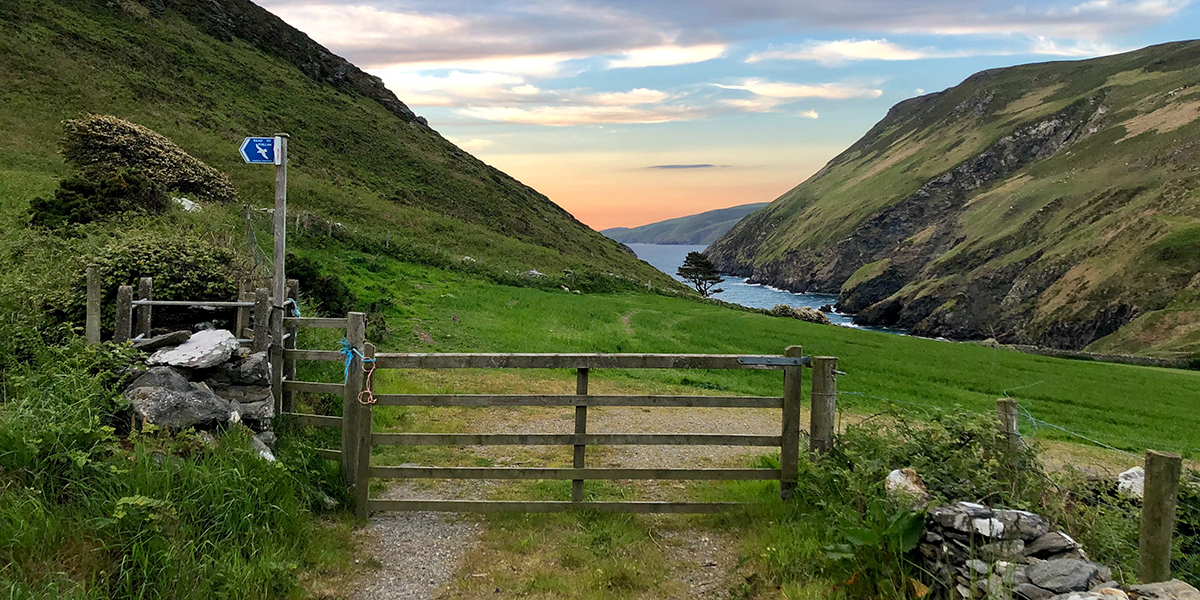Footnotes – A Journey Round Britain in the Company of Great Writers
An Introduction by the author & excerpt from the book
Writer Peter Fiennes introduces his latest book, Footnotes – A Journey Round Britain in the Company of Great Writers
In 1964, when John Betjeman came to update his 1933 Shell Guide to Cornwall, he was overcome with rage and despair. So much had changed in the 30 years since the first edition, he wrote, ‘that the text has had entirely to be rewritten.’ The Cornwall he knew, and the one he thought he remembered from his childhood, when ‘everyone in the village had oil lamps and candles’, had disappeared. Roads had been widened, cottages torn down to make way for car parks, and traffic jams now stretched from moor to port. In a rising crescendo of nostalgia, he mourned the days – before the great upheavals of the mid-twentieth century – when the only people who visited Cornwall were ‘fishermen, golfers and artists’. He manages to make it sound like they were all wearing tweed…
Of course, life for the majority in Cornwall in the early twentieth century was not the same as that experienced by Betjeman and his holidaying family. And his delight in the idea that in the 1930s ‘a journey to the nearest town and back was a day’s expedition’, would no doubt have been welcomed by most people with a demand for better roads and a car of their own.
For my book, Footnotes, I followed a series of writers around Britain, partly to try and understand the accelerating changes that have unfolded over the past 800 years. The earliest writer was Gerald of Wales, author of the first travel guide to Wales in 1188; the most recent was Beryl Bainbridge, who smoked her way round England in 1983. I steeped myself in their books, journals and letters, and followed their journeys as closely as I could, and then I looked up to see what was there today. It was like stepping off a train in a strange land, or coming home after a long time away. Everything was more vivid.
It was hard to ignore John Betjeman in Cornwall (he has a strong voice), but most of the time I was on the trail with Wilkie Collins, author of The Moonstone and The Woman in White, who as a young man walked along the coast from Plymouth to Land’s End and then back along the north of the county in 1850, and recorded what he saw in a book called Rambles Beyond Railways. He was there just before the first Cornish railway was completed, trekking – he claimed, in an onrush of self-publicity – through an unexplored wilderness.
Along the way, he passed Lamorna Cove, which is where the great surrealist artist and writer, Ithell Colquhoun, lived and worked in a small corrugated iron shack after her marriage to a Belgian surrealist painter broke down during the Second World War. (If you’re wondering, her name is pronounced ‘eye-thull ker-hoon’.) She wrote a book about Lamorna in the 1950s, The Living Stones, a spellbinding evocation of the deeper connections of a much-loved place. ‘It was in Lamorna,’ she wrote, ‘that I first saw the falling of the dew, and it was at Penberth that the shifting of the landscape-veil first presented itself to my clear sight, disclosing – what?’
The changes that all of these writers witnessed are acute and relentless, but most of the time they went unnoticed. This is what is known as ‘shifting baseline syndrome’ – the disorientating idea that as every generation passes, our understanding of what is ‘normal’ moves, without us even realizing it. Of course, so many of these changes are to be celebrated: most of the time we are oblivious to the advances that sustain us. But I also found myself asking an obvious question: how do we know if life is getting better, or worse? And who for, exactly?
In fact, we shouldn’t be limiting this question to humanity at all … because surely by now we have got the message that our lives are not separate from everything else in these islands that connects and supports us. We urgently need to lift our eyes and take the long view.
An Excerpt from Footnotes
Ithell Colquhoun, renting a shack further down the coast, wrote in 1957: ‘I have never spent a whole year at Vow Cave and am sorry now that I did not do so before Lamorna became, during the summer months, uninhabitable.’ And I remember my own first Cornish holiday, aged eight, in 1971, when the sun blazed and the surf rolled and we had miles of golden sandy beaches all to ourselves. Didn’t we? I certainly remember my first trip to the Mediterranean a couple of years later. We were spending ten days in the hills of Provence, not far from Mont Ventoux, and we had been promised a day at the seaside, even though my father (my kind, gentle, but – he’d be the first to admit – somewhat gloomy father) explained that there was almost no point in going, what with the insufferable crowds and the rank pollution (discarded picnics and plastics and French effluent) and the fact that the once pristine Mediterranean sea (the wine-dark sea of Homer and Dumas and Matisse) had been poisoned and blighted with oil spills and emptied – dragged clean – of all its teeming fish and every last scrap of sea life. And I remember heading south in our white Triumph 2000 Estate, with the cicadas shrieking at the open windows from the hot, scented hills; and how we surged over the last rise and there, laid out in front of us, was a vision of such potent beauty – the light leaping from the radiant sea, the almost empty beach glittering with ochre and gold – that we were all briefly struck dumb. And then we were seized with laughter, hysterical from the car journey, my mother too, overcome with wonder and joy to see this heart-stopping, undeniable beauty; and the look on my father’s face – amusement? disappointment? – as he started to explain (and then quickly stopped) that what we think we can see is not the same as what there is.
I’m not saying my father was wrong. In fact, and alas, today the Mediterranean is sicker and emptier than ever before (and still undeniably blue and lovely). And Britain’s own seas and shoreline, that once seethed with whales, walruses, dolphins, pilchards and puffins, are silent and sodden with invisible plastics. We all understand this in theory. But we are also having to contend with something known to conservationists as shifting baseline syndrome, the bewildering and endless realignment of what constitutes ‘normal’ – from Wilkie to Betjeman, from Ithell to us – so that we can no longer remember, or have no first-hand knowledge of what it was like to see butterflies thick in the meadows and starfish in every rock pool. We are rightly suspicious of our golden childhood memories, but none of us ever lives long enough to notice that the tap of life is being screwed shut.
When Wilkie was here in Kynance Cove he was alone, in August, apart from his friend Henry (sketching on the cliffs) and his indefatigable guide; and now here we are in April, and there are 400 vehicles in the car park and cruise ships disgorging tourists into the bay. I’m not saying that’s wrong: who are we to say who should or should not be enjoying this extraordinary cove with its rainbow waves and shimmering rocks? Not John Betjeman, let’s hope, nor me. Back in Wilkie’s time most people had to work hard just to scrape by. But there’s no avoiding the fact that there are an awful lot of us these days, on the move and keeping busy, scurrying up and down the land, nosing along the coast, looking for a lost lane or a lonely beach, and all the while buying and using and accumulating and shedding an unfeasible amount of stuff.
Imagine what this beautiful cove was like one hundred and fifty years ago. And be honest. Wouldn’t you rather have it all to yourself – maybe you and a few others – as Wilkie once did?
Then again, who wouldn’t? I mean, I know I would.
Footnotes – A Journey Round Britain in the Company of Great Writers is published by Oneworld Publications, 2019
Read a review of Footnotes by Jon Woolcott

Peter Fiennes worked as a publisher at Time Out and has written three books – To War with God, which tells the story of his grandfather's time as an Army Chaplain at the front in World War I. Oak and Ash and Thorn: the Ancient Woods and New Forests of Britain, looks at our long and complicated relationship with the woods and trees: their magic and mystery, culture, folklore, conservation and the grim history of their loss. And Footnotes – A Journey Round Britain in the Company of Great Writers published by Oneworld in 2019.
